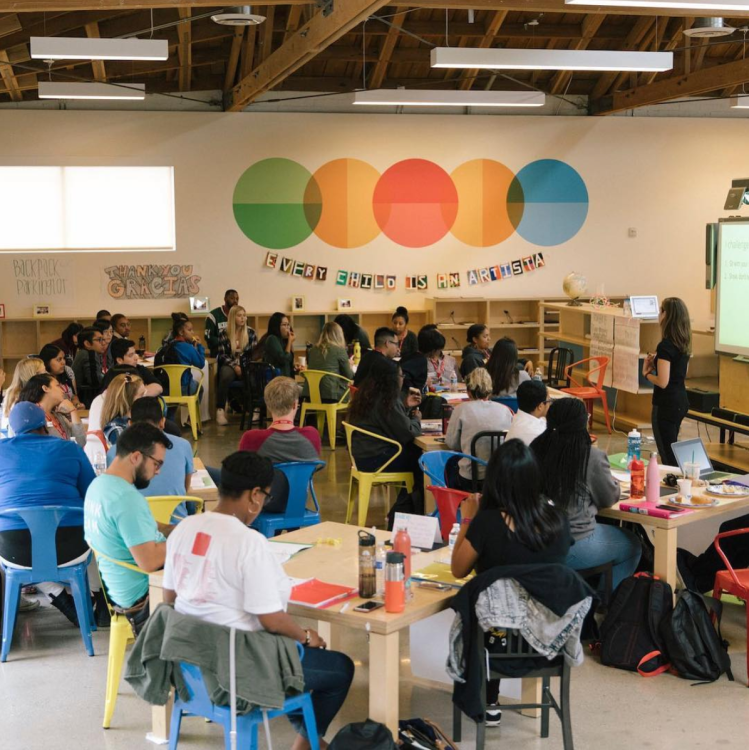Riot Games is bringing its game design experience to something beyond its smash hit multiplayer online battle arena League of Legends. It has partnered with 9 Dots, an organization that focuses on getting kids in Los Angeles interested in computer science.
In addition to after-school sessions, 9 Dots also runs summer programs and hosts showcases. Its curriculum loops in activities like robotics, creating stop-animation films, and coding. It’s not only trying to get students excited about programming, but also to keep them interested through high school. The latter is something that Riot will be collaborating with them on.
Riot head of corporate social responsibility Jeffrey Burrell says that 9 Dots noticed debugging was one of the most frustrating things for students to learn. It developed a game to make it more interesting for kids to learn how to debug. It’s a high-concept approach to the process: The students move a snake around on the screen, determine what’s wrong with it, and make changes to the code. Now Riot will be bringing in its knowledge of game design to make the game more engaging.
“What we’re looking to do is, we have game designers on staff, so we’re going to partner with them and try to use some game design elements and some of our engineers here to really see if we can add a bit extra to that program, see if we can shorten the dropout rate, particularly around the debugging process,” said Burrell in a phone call with GamesBeat.
June 5th: The AI Audit in NYC
Join us next week in NYC to engage with top executive leaders, delving into strategies for auditing AI models to ensure fairness, optimal performance, and ethical compliance across diverse organizations. Secure your attendance for this exclusive invite-only event.
Burrell leads an internal department called Riot Karma, which focuses on investing in what he calls “three key pillars around education, opportunity, and citizenship.” 9 Dots caught its attention because of its approach, which builds a foundation of computer science skills that can help maintain students’ interest through high school and beyond. It’s the first time Riot has partnered with an after-school program.
“We’re looking at 9 Dots for the L.A./San Diego area because we liked their evidence-based approach to getting more people involved and geared up for computer science skills, so they can carry that with them going into postsecondary education,” said Burrell. He added, “We take a bit of a portfolio approach. We really like 9 Dots for how they integrate into the classroom themselves, but we’ve also partnered with Girls Who Code, and we’re looking at a few others to hit on different aspects around computer science education.”
Some of Karma’s other initiatives include a global fundraiser, which generated $2.5 million for charities like the mental health nonprofit Basic Needs, and a partnership with the Raspberry Pi Foundation.
“The Raspberry Pi Foundation — the guys who create those tiny little computers—they’re a nonprofit, and we worked with them to scope out ways we could expand computer science dojos, about 5,000 of them across six continents, and scale up to teach people computer science education and interacting with technology,” said Burrell.
Riot is also working with researchers to identify why some students lose interest in computer science, particularly girls. Burrell says that 9 Dots’s experience in the classroom may provide valuable information to help pinpoint new details, such as the insight around debugging.
“It’s one of those issues that, if we don’t do something about it now, it’ll create tremendous problems – not just for the technology industry, but for everyone, looking more toward the future,” said Burrell. “We’re trying to find new ways to create these positive interventions now, so we can start to level up our skills in the future.”
And one of the ways to create “positive interventions” is to support programs like 9 Dots, which has developed a creative approach to teaching computer science.
“If you can design a curriculum to keep kids engaged, and always striving and learning more, and make it fun in the process, make it creative and get them to explore, I think that’s a great way to start to change the narrative on engaging in computer science,” said Burrell. “Particularly around underserved people in tech. They don’t think it’s for them. If you can show, hey, it’s for everybody – it’s fun, you can create cool stuff, it can set you up for a great career – I think that’s a strong aspect to get more people at least to the gates of college to study computer science.”


